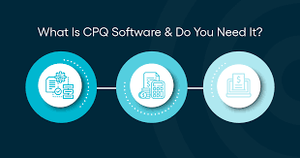Why CPQ Software Is Critical for Modern Manufacturing Sales
الجسم
In today’s hyper-competitive manufacturing industry, sales processes must be faster, more accurate, and more tailored than ever before. Manufacturers face increasing pressure to deliver complex products, handle customized configurations, and meet tight deadlines — all while staying profitable. This is where CPQ (Configure, Price, Quote) software steps in as a game-changer.
What Is CPQ Software?
CPQ stands for Configure, Price, Quote. It’s a category of software that helps companies accurately configure products or services, determine pricing, and generate professional sales quotes. CPQ software is often integrated with CRM and ERP systems to streamline the end-to-end sales process.
For manufacturers dealing with complex product catalogs, CPQ tools simplify and automate the quoting process, reducing errors and enhancing customer satisfaction.
The Complexity of Modern Manufacturing Sales
Customization Demands Are Higher Than Ever
Customers today want products tailored to their specific needs. In manufacturing, this can mean thousands of possible configurations for a single product. Managing such complexity with spreadsheets or manual processes is not only inefficient but prone to costly mistakes.
CPQ software allows sales teams to configure products accurately based on a predefined set of rules, ensuring feasibility from both a technical and pricing standpoint.
Competitive Pressure Requires Faster Response Times
In manufacturing sales, speed often wins the deal. Responding quickly to RFQs (requests for quotes) can be the difference between winning and losing business. However, the time required to gather configuration data, check pricing, and validate availability often slows down the process.
With CPQ, manufacturers can generate accurate quotes in minutes instead of days. This increased speed helps sales teams close more deals and improve customer experience.
Key Benefits of CPQ Software in Manufacturing
1. Streamlined Product Configuration
One of the most important features of CPQ software is its ability to guide users through complex product configurations. The software uses logic rules to ensure only valid product combinations are selected, avoiding incompatible options.
For example, if a machine has electrical, mechanical, and size constraints, CPQ ensures configurations adhere to these parameters automatically.
2. Accurate and Automated Pricing
Manufacturing pricing can involve multiple variables — raw material costs, labor, delivery timelines, discounts, and customer-specific pricing tiers. CPQ software calculates pricing dynamically based on these factors, ensuring accuracy and consistency.
This reduces revenue leakage caused by incorrect discounts or outdated price lists and enhances profitability.
3. Faster Quoting and Shorter Sales Cycles
Manual quoting can take days or even weeks for complex orders. CPQ for manufacturing reduces this to minutes by automating the generation of proposals, BOMs (Bills of Materials), and other documents.
The result? Sales teams can respond faster, reducing the overall sales cycle and increasing customer satisfaction.
4. Seamless Integration with CRM and ERP Systems
Modern CPQ systems integrate seamlessly with customer relationship management (CRM) tools like Salesforce and enterprise resource planning (ERP) platforms like SAP or Oracle. This integration ensures smooth data flow between departments — from sales to engineering to finance — eliminating duplication and improving collaboration.
The Strategic Impact of CPQ on Manufacturing Sales
Improved Sales Efficiency
CPQ empowers sales teams to focus on selling rather than spending time on administrative tasks. The software provides guided selling tools that help even less-experienced reps build complex quotes without technical assistance. This reduces reliance on engineering and speeds up the sales process.
Enhanced Customer Experience
Customers expect fast, accurate, and personalized service. CPQ enables manufacturers to meet these expectations by delivering real-time quotes, visual product configurations, and error-free proposals. The result is a more professional sales experience that boosts trust and confidence.
Better Decision-Making with Analytics
Many CPQ platforms offer built-in analytics and reporting features. Sales leaders can gain insights into quote-to-order conversion rates, pricing trends, discounting behavior, and customer preferences. This data supports more strategic decision-making and continuous process improvement.
Use Cases: How Manufacturers Are Leveraging CPQ
Industrial Equipment Manufacturers
Companies building complex machinery rely heavily on CPQ to manage thousands of parts, features, and customer-specific configurations. CPQ ensures that configurations are feasible and compliant with engineering constraints.
Automotive and Aerospace
In highly regulated industries, accuracy and documentation are critical. CPQ provides audit trails, approval workflows, and version control, ensuring compliance and traceability throughout the quote-to-cash process.
Electronics and High-Tech
Rapid innovation and product cycles require agile quoting systems. CPQ enables quick updates to product catalogs, pricing, and rules, allowing sales teams to adapt to new offerings without delay.
Common Challenges Without CPQ
Operating without a CPQ solution can lead to:
-
Frequent quoting errors due to manual data entry
-
Slower sales cycles as teams wait for approvals or engineering input
-
Lost revenue from underpricing or missed upsell opportunities
-
Frustrated customers due to inconsistent communication
-
Misalignment between sales, operations, and finance teams
These challenges not only reduce efficiency but also erode competitiveness over time.
How to Choose the Right CPQ for Your Manufacturing Business
When selecting a CPQ solution, manufacturers should consider:
-
Industry-specific functionality – Can the CPQ handle your product complexity and industry needs?
-
Integration capabilities – Does it integrate well with your current CRM, ERP, and PLM systems?
-
Scalability – Can it grow with your business and handle increasing product lines?
-
Ease of use – Is the interface intuitive for both sales and technical users?
-
Vendor support – Is there strong support and training available for implementation and beyond?
Choosing the right CPQ solution is an investment that can deliver significant long-term ROI through improved sales performance and operational efficiency.
Final Thoughts: CPQ Is No Longer a Luxury—It’s a Necessity
The manufacturing sales environment has evolved. Buyers are more demanding, products are more complex, and competition is fiercer than ever. In this context, CPQ software is not just a tool — it’s a strategic asset.
Manufacturers that adopt CPQ solutions position themselves to respond faster, sell smarter, and operate more efficiently. Those that don’t risk falling behind competitors who can deliver a better, faster, and more accurate customer experience.
If your manufacturing sales team is still relying on spreadsheets or manual quoting, now is the time to consider implementing CPQ. It’s an essential step toward modernizing your sales process and staying competitive in the Industry 4.0 era.






تعليقات